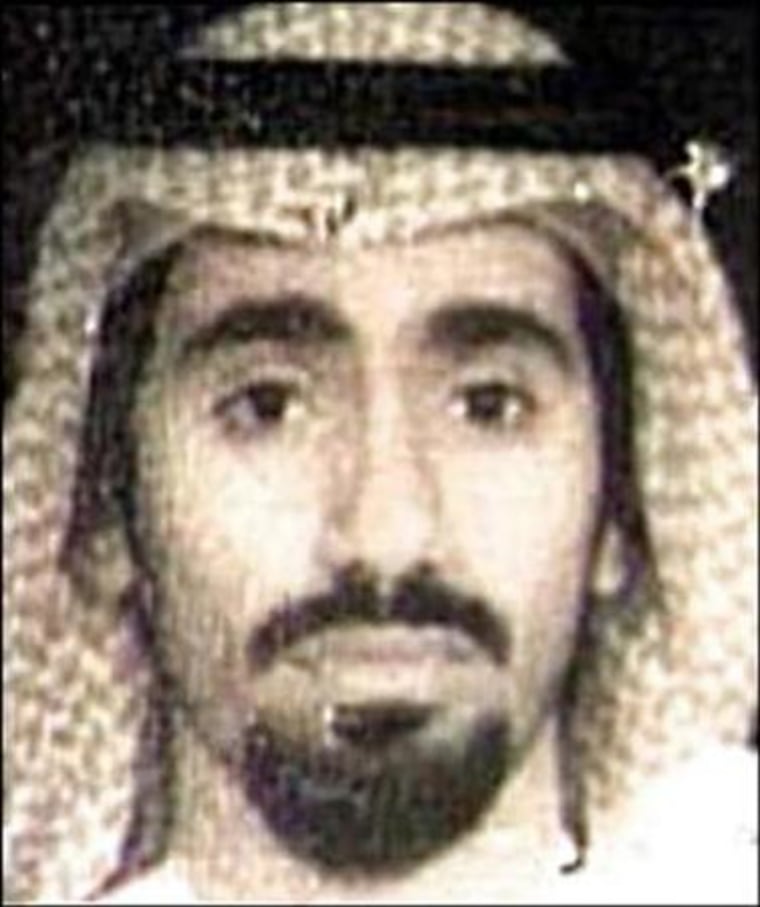An alleged al-Qaida chieftain accused of launching a deadly bomb attack in 2000 on a U.S. Navy ship was arraigned on Wednesday at a U.S. military tribunal hearing marked by questions about how the judge would handle potential evidence of torture.
Abd al Rahim al Nashiri, a rotund 46-year-old Saudi with close-cropped black hair and dark stubble, appeared in public for the first time during his nine years in U.S. custody.
Facing a top-security courtroom at the Guantanamo Bay U.S. naval base in Cuba, he postponed entering a plea and waived the reading of war crimes charges that include murder, attempted murder, conspiring with al-Qaida and attacking civilians — charges that could eventually lead to his execution if he is convicted.
Nashiri is accused of orchestrating the October 2000 attack that killed 17 sailors and wounded three dozen more on the USS Cole. Suicide bombers detonated a boat full of explosives alongside the ship while it refueled in the Yemeni port of Aden, blowing a 30-foot hole in the hull. He is accused of launching a similar attack that killed a crewman aboard a French oil tanker off Yemen.
Nashiri sat unshackled with defense lawyers at one side and a row of Navy guards in camouflage uniforms on the other. He listened through earphones to an Arabic-English interpreter as the judge, Army Colonel James Pohl, asked if he was satisfied with his four U.S. military and civilian lawyers.
Nashiri said that he was although "I do not pronounce the names perfectly."
"Neither do I," the judge replied, prompting a smile from Nashiri.
When the case is ready for trial in a year or two, a military jury is expected to hear gruesome details of the attack on the Cole, descriptions of bloody decks and sailors' mangled bodies embedded in metal walls shredded by the blast.
Allegations of torture
Wednesday's hearing dealt with preliminary issues, such as whether the lawyers or judge had conflicts that could prevent the alleged former head of al-Qaida operations in the Arabian Peninsula from receiving a fair trial and how the judge would handle allegations that Nashiri was tortured.
Nashiri was captured in Dubai in 2002 and held in secret CIA prisons before being sent to Guantanamo in 2006. The CIA acknowledged destroying videotapes of interrogations, during which he was stripped naked and hooded while a gun was loaded and a power drill revved next to his head. He also was subjected to "waterboarding," which creates the sensation of drowning.
Nashiri has said he gave false confessions to get the interrogations to stop
"By torturing Mr. Nashiri the United States has really lost all moral authority to try to kill him," defense attorney Richard Kammen said outside the courtroom.
In court, Kammen asked the judge whether he considered torture to be a mitigating factor that might prevent Nashiri's execution even if he is convicted of all the charges.
"You're breaking uncharted territory," Kammen said, noting Nashiri's trial will be the first on capital charges in the Guantanamo tribunals.
Pohl said it would be up to the jurors to determine any sentence and that his own opinion was irrelevant. Questioned further, the judge said he would follow trial rules that prohibit the use of evidence obtained by torture or cruel, degrading or inhuman treatment.
"The rules are the rules," Pohl said. "I'll apply the rules as they're given to me by statute and case law."
If there is evidence that U.S. personnel committed or approved acts of torture, Kammen asked, would the judge refer that evidence to authorities so the perpetrators could be punished as required under U.S. law and international treaty?
Pohl replied, "I will comply with the requirements of the law."
